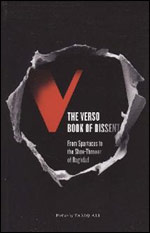 Its subtitle is From Spartacus to the Shoe-Thrower of Baghdad, but the book's scope is a bit wider than that, beginning with "The Tale of the Eloquent Peasant" – a surprisingly successful plea for justice from 12th-dynasty Egypt (c1800 BC) – and ending with Henning Mankell on breaking the blockade of Gaza this year. Unsurprisingly, if a little disappointingly, it's heavily weighted towards the modern era: it takes a mere 40 pages to get to the 19th century, and there are still 320 pages to go. One may usefully ask oneself why this is the case; and why there is nothing from the Bible, which, unless I have completely missed the point, contains an enormous amount of dissent.
Its subtitle is From Spartacus to the Shoe-Thrower of Baghdad, but the book's scope is a bit wider than that, beginning with "The Tale of the Eloquent Peasant" – a surprisingly successful plea for justice from 12th-dynasty Egypt (c1800 BC) – and ending with Henning Mankell on breaking the blockade of Gaza this year. Unsurprisingly, if a little disappointingly, it's heavily weighted towards the modern era: it takes a mere 40 pages to get to the 19th century, and there are still 320 pages to go. One may usefully ask oneself why this is the case; and why there is nothing from the Bible, which, unless I have completely missed the point, contains an enormous amount of dissent.
In a slightly loopy but entertaining and useful preface, Tariq Ali explains not this absence, but the absence of any dissent from the early stone age. (A joke, perhaps?) Still, it is good to be reminded of the words of Basil of Caesarea, from the fourth century AD: "If each one would take that which is sufficient for his needs, leaving what is superfluous to those in distress, no one would be rich, no one poor . . . The rich man is a thief." Has anyone ever put the case for the redistribution of wealth more concisely and unarguably than that?
This is a delightful anthology to dip into if you are or have ever been disgruntled with the status quo. You get one entry per dissenter (there are two indexes: one by alphabetical order, and one breaking this down into geographical regions, which is helpful and reminds us of the book's worldwide reach), sometimes a quotation as short as a sentence; larger extracts for the more significant ones – four pages from The Communist Manifesto, for instance. There are notes explaining the context of each entry and little biographies, where necessary, which are masterpieces of concision.
The entries give the impression that dissent comes in clumps. There's a lot of protest about racism in the late 1930s (CLR James, Lead Belly, Richard Wright's "F B Eye Blues" and Abel Meeropol's "Strange Fruit" all coming consecutively). There's some good hardcore agitation against colonialism in the early 60s and, of course, a load of old hippy nonsense from the late 60s. I suppose it is a measure of the book's spirit of inclusion that we have a quotation from Valerie Solanas's "Scum Manifesto", the only entry in the book I've found that really shouldn't be there, unless as an object lesson in how not to write a manifesto or as an indication of how bonkers people were in those days.
I suppose it also helps to prevent the book from being too pleased with itself. This has been published to mark Verso's 40th anniversary – happy birthday to Verso – and this is a very good way of celebrating it. This isn't history as triumphal march: it's (largely) a history of all the people who have tried to impede the progress of injustice. Interesting how sometimes even the chroniclers of the victors can let the words of the vanquished resonate through the ages, such as Tacitus's attribution of the words "they make a desert and they call it peace" to the Caledonian chieftain Calgacus. (The translators here have chosen to render the Latin "solitudinem" as "solitude" rather than "desert". I'm afraid that with a poor C at O-level I can't tell you if this is an improvement or not.)
I had worried that the bite-sized nature of many of the entries here would betray a glib understanding of, or approach to, the subject, but this isn't a problem at all: there's a discipline to the selection process which makes one want to go off and learn more about the subjects touched upon. All the usual suspects are here, but there are also plenty of unusual ones, too. There are one or two odd moments, as when Blake's "Jerusalem" – or four lines from it – goes in under 1915, even though a note says it was set to music by Sir Hubert Parry in 1916. I presume they know what they're doing, though I'm a bit baffled. But this is book for radicals everywhere, both armchair and otherwise.
The Guardian